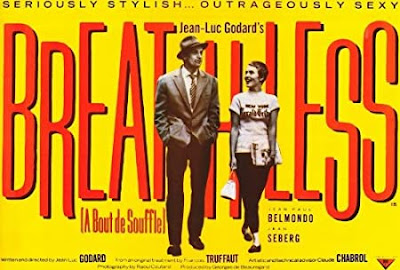 | |
| Original French poster for "Breathless" |
I can’t pretend to be an enormous fan of Jean-Luc Godard, the French/Swiss cinephile whose movies shook up the status quo of the filmmaking world for a remarkable 60 years. Godard (who died September 13) made films I found far more provocative than enjoyable. But he always had something interesting on his mind, and he was certainly terrific with quips about the nature of cinema. Godard, who like most French filmmakers coming out of the Sixties began as a critic, certainly knew how to boil the film medium down to its essence. One of his most familiar aphorisms could also be the motto of my former boss, Roger Corman: “All you need to make a movie is a girl and a gun.”
Godard’s appreciation for classic genre films (like American film noir and “lovers on the lam” flicks) led him to make his own hardboiled crime dramas. These obviously include the one that kickstarted his career, 1960’s Breathless, starring Jean-Paul Belmondo as a petty Paris crook and Jean Seberg as the girl who betrays him. Through my own research on the great American films of the late Sixties, I was surprised to discover the intimate connection between Godard’s sort of deliberately ironic filmmaking and 1967’s indelible Bonnie and Clyde. The unheralded young writers of that script, Robert Benton and Thomas Newman, were such fans of the French New Wave that they watched films like Breathless and François Truffaut’s Jules and Jim multiple times and sought to make their own hero, Clyde Barrow, a cool gangster-type in the Belmondo mold.
When Benton and Newman managed to meet Truffaut in New York City to discuss their project, he showed his passion for low-rent American crime drama by screening for them 1950’s Gun Crazy, a sleek and moody black & white road pic starring Peggy Cummins and John Dall. But despite his enthusiasm for Bonnie and Clyde, Truffaut was already committed to filming Fahrenheit 451, his only English-language film. (Big mistake, in my opinion!) That’s why he turned the script over to his pal Godard, who seriously considered it. As I recollect, Godard aimed to move quickly, paying little mind to the Texas locale and the period authenticity of Clyde and Bonnie’s historic crime spree, so I’m relieved that the material finally came into the hands of Arthur Penn, a meticulous craftsman who made it his masterpiece. Still, Godard didn’t give up on his fascination with gangsters, treating them with fierce and funny irony in Pierrot le Fou.
We’ve seen two other important movieland deaths in the last week or so. Marsha Hunt, a rising actress whose career was derailed by the Red Scare of the 1950s, lived to be 104. Though a mention in Red Channels stopped her career momentum forever, she never lost her courageous commitment to causes in which she believed. I met her about ten years ago at a do-good event related to climate change. Appropriately, she was treated as a most honored guest.
I was especially saddened to read about the passing of the lovely and soulful Greek actress, Irene Papas. In the era when I was discovering foreign-language cinema, her appearances in films based on the classical Greek tragedies were not to be missed. Yes, she also made Hollywood movies like The Guns of Navarrone, but I will always think of her in the title roles of Antigone and Electra. In the latter film, she was directed by the great Michael Cacoyannis, who used her cinematic firepower again later in The Trojan Women and Iphigenia . . . and of course in Zorba the Greek.








No comments:
Post a Comment